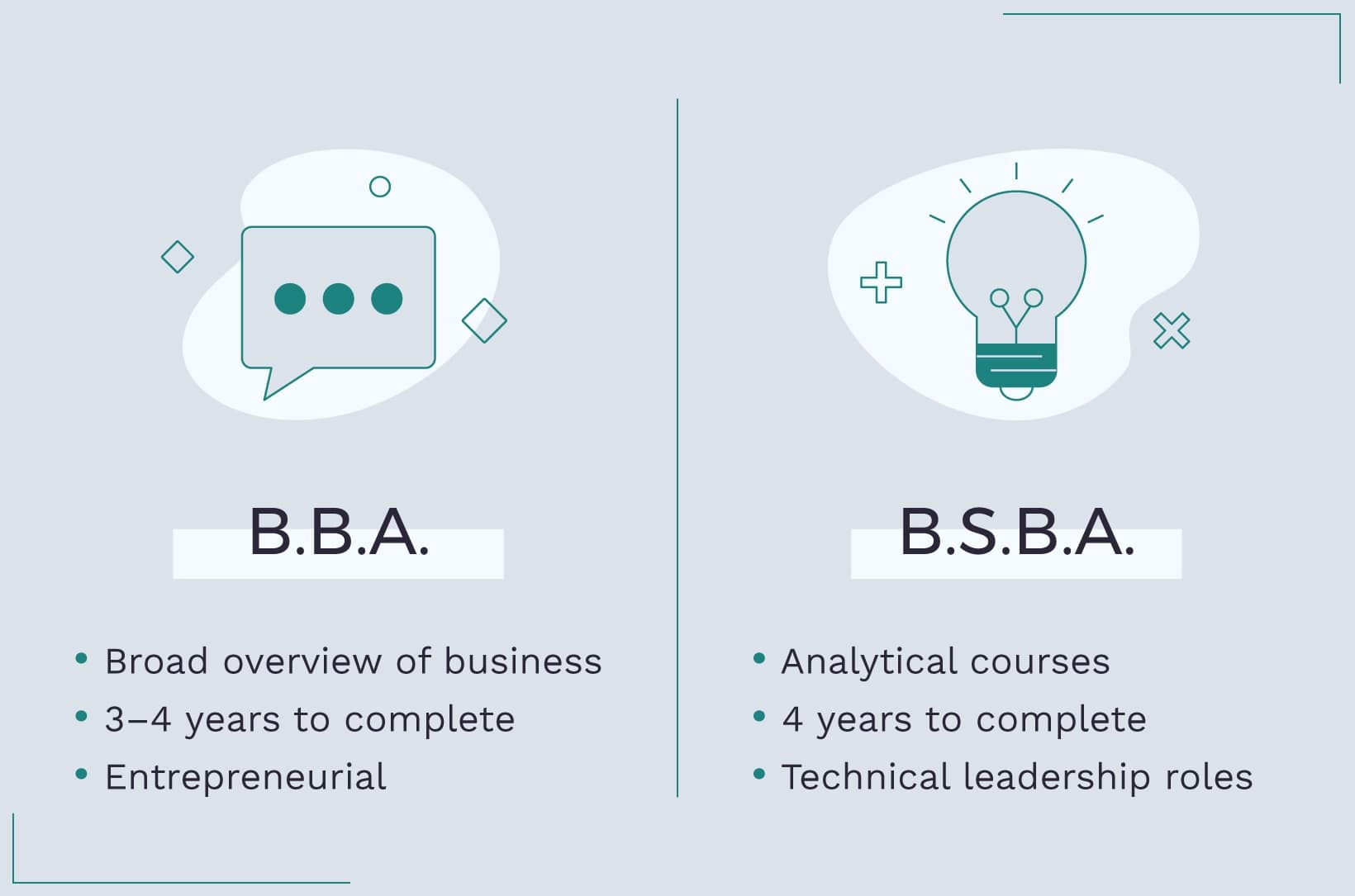Getting down to business: What’s the difference between B.B.A. vs. B.S.?

Obtaining a business degree can help equip you with the proper knowledge to break into various industries such as manufacturing, education, healthcare, music, and more. However, business degrees are not one-size-fits-all.
There are 2 main business degrees a student can pursue — a Bachelor of Business Administration (B.B.A.) or a Bachelor of Science in Business Administration (B.S.B.A.) — which can prepare you for different career paths in the business world.
To make the right decision for your career, you first need to know the distinction between the types of degrees. Let’s dive in to explain what B.B.A. and B.S.B.A. degrees are, how they differ, and which one is right for you.
- Overview: B.B.A. vs. B.S.
- B.B.A. degree
- B.S.B.A. degree
- Major differences between B.B.A. vs. B.S.?
- Flowchart: Which is better for you?
Overview: B.B.A. vs. B.S.
Though a B.B.A. and B.S.B.A. degree fall under the same umbrella, they still have their differences in program length, coursework, and career opportunities. If you’re not sure which degree to pursue, we cover the basics below

What is a B.B.A. degree?
B.B.A. stands for Bachelor of Business Administration and is one of the most common degrees in business education. A B.B.A. gives students a broad understanding of how companies function. You’ll learn general principles for how businesses operate and develop skills in communication and business decision-making.
The degree strengthens communication, critical and analytical thinking, adaptability, and multitasking skills, thus preparing students for careers in management, economics, sales, and marketing. You can also get this degree online.
These are essential qualities for a B.B.A. graduate breaking into the business world.
B.B.A. program length
The B.B.A. program takes anywhere between 3 and 4 years to complete, focusing on giving a vast overview of many disciplines in the business world. Over the span of the program, students are prepared to take on managerial positions with a wide variety of courses to help them after graduation.
Typical coursework
The B.B.A. degree aims to give a broad understanding of various disciplines in the business field. The typical courses of a B.B.A. degree include the essentials of management, marketing management, production, and operation management, among others. Below are some specializations available in this degree:
- Aviation
- Logistics and Supply Chain Management
- Strategic Finance
- Entrepreneurship
- Business Analytics
- Finance and Accountancy
- International Business
- Travel and Tourism Management
B.B.A. career opportunities
A B.B.A. degree offers a wide variety of job opportunities, from marketing to finance to human resources. Check out some of the most popular B.B.A. careers below:
- Account manager
- Budget or management analyst
- Procurement officer
- HR manager
- Marketing manager
- Healthcare administration
What is a B.S.B.A. degree?
A Bachelor of Science in Business Administration, or B.S.B.A., is the same as a B.B.A. in the sense that it prepares students for the business world, but instead goes into a narrower range of topics at a deeper level. Similar to the B.B.A., you can also get this degree online. Students pursuing a B.S.B.A. can learn more about the technicality of business models and theories and focus on real-life application.
Courses are focused on acquiring financial and technical skills, and typically consist of subjects centered around ethics, technical leadership, finance law, statistics, economics, and corporate finance. The degree prepares you to transform business knowledge into actionable strategies.
B.S.B.A. program length
A B.S.B.A. degree takes 4 years to complete. The B.S.B.A. program requires a full 4 years and allows students to expand their math skills applicable in the business world. Students pursuing a B.S.B.A.in business degree usually spend the first 2 years studying general business courses and the next 2 specializing in their selected concentration.
Typical coursework
In contrast to a B.B.A., a B.S.B.A. degree is focused more on scientific aspects of business. This means that B.S.B.A. graduates have expanded knowledge in STEM topics such as advanced math, economics, and statistics. Here are the different specializations that are available in this degree:
- Accounting
- Business Analytics
- Finance
- General Business
- International Business
- Legal Studies
- Management Information Systems
- Marketing
- Operations and Supply Chain Management
- Real Estate Management and Development
- Technology Innovation Management
B.S.B.A. career opportunities
Graduates with a B.S.B.A. degree have the knowledge to tackle more complex problems than graduates with a B.B.A., which allows them to take more leadership roles. The most common job titles for B.S.B.A. graduates include:
- Financial analyst
- Business consultant
- Supply chain manager
- Market research analyst
- Sales manager
- Accountant
What is the difference between B.B.A. vs. B.S.B.A?
The main differences between B.B.A. vs. B.S.B.A degrees include the coursework, program length, and career paths. Understanding these factors can help you decide which degree is right for you and prepare you for the journey ahead.
1. Coursework
As a B.B.A. student, your coursework may focus on conversational skills as well as critical thinking. Compared to a B.S., a B.B.A. degree tends to lean toward more liberal arts classes that prepare you for the business world.
On the other hand, a B.S.B.A. is focused more on what its name suggests: science. Your coursework can be more technical and may focus on various business models and theories that can be applied within the industry.
2. Program length
Program length may differ between the two degrees. Both may be completed within a 4-year time span, but depending on the difficulty of your coursework and amount of units you’re taking, these numbers can differ. A B.S.B.A. program might take longer than B.B.A., but again, it varies by institution.
Under a Bachelor of Science degree, you’re required to attend for 4 years — the first 2 years are focused on general courses and the next 2 are specialized for your selected concentration.
Courses for B.B.A. students are typically completed in 4 years as well and are mainly focused on providing a vast overview of the many disciplines in business.
3. Career path
If you’re pursuing a B.B.A. degree, your career path could lean toward relationship-building and business management roles, such as marketing, human resources, or consulting.
As a B.S.B.A. student, your courses prepare you for more technical roles in the business world that require analytical thinking. This includes but is not limited to financial analysis, research analysis, or sales.
B.B.A. vs. B.S.B.A. program: Which is better for you?
Job opportunities are available for both, but when choosing between the 2 degrees, you have to know your strengths and your future career goals. Additionally, both of these degrees aren’t a necessary requirement for an MBA.
The B.B.A. is a commerce degree, best if you’re looking to obtain:
- Management skills
- Excellent sense of general business operations
- Experience for more of the people-facing elements of business
Conversely, the B.S.B.A. degree is a technical business degree, with an emphasis on:
- Technical aspects of running a business
- Excellent sense of business logistics and data
- Experience for more of the technical, and less of the people-facing elements of business
Both B.B.A. and B.S.B.A. degrees are great pathways for students with a future in business, though they differ in some critical areas based on what they teach and how they’re presented. However, no matter which one you choose, you can rest easy knowing that you’re gaining the right business knowledge to use in your future and career planning.






